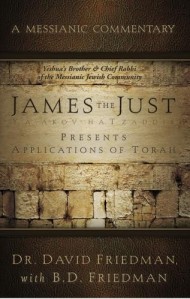The book of James has often been called the ‘Proverbs’ of the New Testament. This is because of James contains many short sayings similar to the book of Proverbs. Yet too many a times, we read the New Testament totally separated — without any sense of the continuity it brings from the Old Testament.
 In this book, David Friedman and B. D. Friedman aims just to show the readers how to read the book of James with an eye on the Old Testament, especially on the book on Leviticus. And this is the clear strength of the book, it helps the reader see the link between the old and new testaments.
In this book, David Friedman and B. D. Friedman aims just to show the readers how to read the book of James with an eye on the Old Testament, especially on the book on Leviticus. And this is the clear strength of the book, it helps the reader see the link between the old and new testaments.
The authors start very wisely by giving the readers an overview of what the book will cover, a short introduction to the book of James and the purpose of the book of James. Chapter 1& 2 forms the apologetics and defence of this thesis. The authors propose that the book of James is a ‘yalqut ’, “a compilation, collection or compendium of Jewish religious writings.” (p. 10), whilst chapter 2 purposes to the readers that James is actually drawing his materials from Leviticus, and it’s actually a ‘yalqut’ of Leviticus. Within this section, the authors quotes multiple sections where similar ideas are raised both in James and Leviticus to show the connection between the two books.
Chapter 3 introduces the author of James, James the brother of Jesus and talks about how James was a rabbi (teacher) during the earliest church time. And in chapter 4, the authors shows more evidences of how James actually uses the Torah in his letters. Lastly in the last chapter, the authors tackled the issue between faith and works. In it the authors showed that there was actually no such dichotomy in proper Jewish thoughts since even the Torah supported the idea that real faith is never alive without works, which James is simply reiterating it to the readers once more, that true disciples are not without works.
Having read this book, I must say this book can only be fully appreciated if you are familiar with both Greek and Hebrews (or with their transliteration) since the authors used both quite regularly. Secondly, this book would be far too thin as a real help for any exegetical work although it is under the “Messianic Commentary” series. The book at best serves as an excellent introduction to the book of James. But there is one flaw with the strength of this book. Although the book is great in showing the continuity of how the new testament is with the old, it does not do so well showing the dis-continuity of the old to new. This is one area that is sorely missing.
Overall, I can only recommend pastors to read this, if they want to see things from the “Messianic Jewish” perspective, if not, i would recommend that readers seek out other more substantial commentaries that is widely available.
Rating: 3 / 5
If you're interested you can get it here and here (free international shipping), Kindle.
Disclaimer: I was given this book free from the publisher in exchange for an honest review.
No comments:
Post a Comment